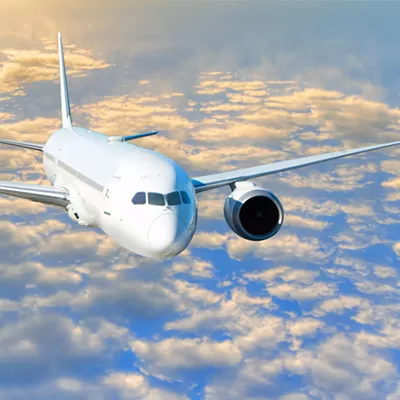We asked a dozen locals the same question, and some familiar answers come up, but what all have in common is the advice that everyone can pitch in -- and must. Now.
So here is the two-cents' worth from some of the region's most dedicated activists -- and they've even recommended a few good books.
Mark Winstein
Founder and President, Ecostructure Financial
Last Good Book: Deep Economy by Bill McKibben
Step 1: Consider Gandhi's statement, "I recognise no one as my enemy on the face of the earth." Step 2: Only do things that are compatible with that notion.
Juliet SinisterraManaging Editor, Out There Monthly, Editor, Go Green Directory Last Good Book: For the Time Being by Annie DillardFor a lot of people, becoming "stewards of the environment" is too abstract. Instead, it might be easier to start with simply becoming a steward of your own life. Start becoming mindful of how your everyday life impacts so many things. Are you mindful of your energy use in your home? Are you mindful of how much water you use? Are you mindful of the waste you produce? Take ownership of your daily practices. Stewardship can apply to all levels of society -- not just wilderness. The more that we feel integral to our place in the world, the more we will work to protect it.
Mark Sprengel
Executive Director, Selkirk Conservation Alliance
Last Good Book: The End of the Wild by Stephen M. Meyer
Reduce human population! Overpopulation is the driving force behind climate change, depletion of aquifers and agriculturally productive soils, destruction of forests and wildlife habitat, decimation of ocean fisheries and the exponential increase in species extinctions.
We need to squarely face difficult issues and refuse to be constrained by "PC-Thought," where departures from orthodoxy are demonized rather than discussed rationally. We need to question the logic of an economic system predicated on the demand for infinite growth on a finite sphere. Disabuse ourselves of the fallacy that purported panaceas like "smart growth" can effect a graceful extrication from our problems. Understand the concept of "biological carrying capacity."
Argyle Baukol
Living Green Specialist, Spokane Neighborhood Action Program
Last Good Book: From Naked Ape to Superspecies: Humanity and the Global Eco-Crisis by David Suzuki and Holly Dressel
To fight global warming and to adapt to it, begin by changing a few common habits. The big key to it is to begin making changes now -- start today. One important step is localization. Imagine all the transportation involved in your life -- commuting to work, buying imported products and traveling. Reducing transportation miles in the big picture will save greenhouse gas emissions while securing regular commodities that may become scarce after peak oil. Also, begin gardening with just one or two vegetables and share the harvest with your neighbors.
Maurice Robinette
Eastern Washington Organizer, Washington Sustainable Food and Farming Network; cattle rancher
Last Good Book: Learning from Ladakh by Helena Norberg-Hodge
Best thing to do for the planet? Buy local. Ultimately all agriculture will have to be sustainable -- that is, environmentally, economically and socially appropriate. Today very little is. Most agriculture relies on large taxpayer-supported subsidies to keep farmers farming. This is in the form of direct government payments, or "hidden" subsidies as cheap energy, primarily oil. The best thing to help this situation is to buy locally. Buying local helps restore long-lost social and cultural relationships between consumers, producers and the environment. It helps reduce the cost of transportation of food from producer to consumer, although half of the energy used to move food is spent after it leaves the retail store. Buying local puts more money in the pockets of farmers and ranchers and reduces their need for subsidies. Buying locally puts better food on your table, so you eat better.
Terry Lawhead
Project Manager, Spokane office of the Washington Department of Community Trade and Economic Development
Last Good Book: Blossoms are Ghosts at the Wedding by Tom Jay
Seek out those relationships within and outside of your family and trust what matters to you: "The signal is a bright and tender look -- calmness and gentleness, freshness and ease of manner..." (Gary Snyder, Earth House Hold). Work to sustain those relationships.
No matter what your dreams or aspirations or affluence (or lack of), strive for thermodynamic fitness. Less heat and more work in everything that we do. Love where you live so much that your heart breaks and is restored every day at the miracle. Work to sustain it. No matter what your age or conventions, have faith in what the young are struggling with. Help them.
Show gratitude for what you get. Never feel you are entitled to get anything. Familiarize yourself with the wastelands and restore something every chance you can. Suffer with the losses. Challenge everything. But reflect on the perils of outrage, bitterness and despair. Imagine those ancestral traits you find admirable and live them. Practice open house solitude.
Mike Petersen
Executive Director, Lands Council
Last Good Book: State of Fear by Michael Crichton. (It reminded me that the Flat Earth Society still has its believers.)
When I think about global warming and how to communicate a sense of urgency, I think about water. In our region, we will see smaller snowpacks, earlier runoff and less water in the late summer. Our landscape used to have its own rhythm of drought-resistant plants and trees. We need to stop irrigating our lawns and non-native trees and get back into the rhythm of our semi-arid climate.
Bart Haggin
Civic Activist
Last Good Book: The Party's Over by Richard Heinberg
We need to live our lives to encourage long-range planning and decision making. Native American tribes planned for five generations into the future. People need to be reminded that this is a finite planet, and we must not just use up finite resources. We must urge our leaders not to assume that tomorrow will be just like yesterday only better. It could be that most human beings are hard wired to be optimistic and to ignore serious problems ahead until a crisis occurs. So more than hope, we need confidence in our abilities and the will to act and organize.
Kitty Klitzke
Eastern Washington Coordinator, Futurewise
Last Good Book: Better Not Bigger: How to Take Control of Urban Growth and Improve Your Community by Eben Fodor
Get a resource like local author Crissy Trask's It's Easy Being Green. Adopt as much of its advice as you can now. Then start thinking about the bigger design of your life, how to reduce vehicle miles traveled and consumption of new/imported goods. Could you live closer to work? Near a bike or bus route? Nearer locally owned markets and thrift stores? Convenient and well-designed dense neighborhoods make it easier to reduce individual impacts, buy local and enjoy your community. For instance, you'd be more likely to use your bike or walk if you had a safe and pleasant route. If you think it's impossible, learn more about community planning.
Pamela Rivers
Regional Vice President, Calvert
Last Good Book: An Unreasonable Woman by Diane Wilson
One way an individual can help the planet become more sustainable: Be conscious of where your money goes. We should be aware of what companies and activities our money supports through our everyday consumption and through our investments. As consumers, we are given many choices in the marketplace. You can be an activist with your dollar by supporting the companies that are working to make our world more sustainable.
Chuck Tingstad
Renewable Energy Consultant
Last Good Book: The Citizen Powered Energy Handbook: Community Solutions to a Global Crisis by Greg Pahl
There are two looming crises that threaten the lives of billions of people on earth: Peak Oil and Global Climate Change. We have perhaps 30 years to enact major economic and social changes to prevent extremely dire circumstances, like massive starvation and bloody energy wars. Since the United States is the biggest consumer of energy, it must lead the way, yet the only real solutions for long-term sustainability are locally and regionally based.
With the end of cheap energy, maximum conservation is key. So is the development of clean renewable energy sources, such as solar and wind power. "Powerdown and relocalize."
Sam Mace
Inland Northwest Program Director, Save Our Wild Salmon
Last Good Book: Salmon Without Rivers by James Lichatowich
Survival in a warming world hinges on preserving keystone species such as wild salmon. Salmon deliver nutrients from the ocean inland to central Idaho, feeding orcas, eagles, bears and people along the way. Removing the four lower Snake River dams becomes even more critical to regional salmon recovery. Fish scientists say Snake River salmon, which spawn in the cold, high-elevation streams found in Idaho's wilderness and elsewhere, may have a better chance of survival with global warming than other lower-elevation Northwest salmon populations.
Comments? Send them totheeditor@inlander.com














